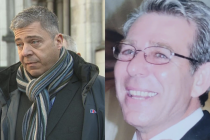The date 2 July 1993 represents a dark day in modern Turkish history where 35 people, mostly Alevi notables, lost their lives in a hotel fire that had been started deliberately. On Sunday, Alevis all around the world, including here in Britain, will again demand justice for the victims.
Thirty years ago, Alevi musicians, writers and poets had gathered at the Madımak Hotel in Sivas, central Anatolia, for a convention to celebrate the life of 16th-century Alevi poet Pir Sultan Abdal, a central figure in the Turkish Alevi faith.
On the afternoon of 2 July 1993, not long after traditional Friday lunchtime prayers, an angry religious mob surrounded the hotel and set it alight, while chanting against the “infidels’ trapped inside.
Eyewitnesses say emergency services failed to intervene and it was some eight hours later that firefighters and police finally tried to put out the fire and help the dozens of victims trapped inside.
Throughout this time, the raging flames were cheered on by the mob that had assembled outside the hotel, and those that tried to escape the fire were forced back inside by the perpetrators or beaten on their way out.
It is believed the primary target was left-wing intellectual Aziz Nesin, despised by conservative Turkish Sunni Muslims after he attempted to publish Salman Rushdie’s controversial novel, The Satanic Verses, regarded by many Muslims as blasphemous.
The local government in Sivas had produced inflammatory leaflets about those attending the convention, distributing them to local people ahead of the gathering at Madımak Hotel, helping to whip the town’s ultra-religious Sunni Muslims into a frenzy.
Although Nesin managed to escape, 33 Alevis perished, including Hasret Gültekin, Metin Altıok, Asım Bezirci, Behçet Aysan, Nesimi Çimen and Muhlis Akarsu. Two hotel personnel also died in the fire, as did two of the mob, bringing the total number of fatalities to 37.
Officially, the Sivas murders are presented as an ‘attack on intellectuals’ and not a religious hate crime
Thirty years on, the Madımak Hotel massacre remains a sensitive issue for the Turkish authorities, who try to sidestep the events that resulted in this heinous arson attack by radicalised Sunni Muslims.
Officially, the Sivas murders are presented as an ‘attack on intellectuals’ and not a religious hate crime, which adds to the injustice Alevis feel.

Repeated efforts to hold a public inquiry into the events of that fateful day continue to be resisted by the right wing and religious parties in the Turkish Parliament.
Three years ago, members from the ruling Justice and Development Party (AKP), far-right National Movement Party (MHP), and nationalist Iyi Party, voted against a fresh motion to identify the perpetrators.
Justice not fully served
In the immediate aftermath of the attack, police arrested dozens of people and by the autumn of 1993, over 150 people had been charged with a variety of offenses, including murder. Most were found guilty of lesser charges, with the courts handing out punishments that ranged from 2.5 years to 15 years in prison.
The murder trials were lengthy, but eventually the State Security Court found 33 defendants guilty and sentenced them to death on 28 November 1997. The defendants appealed the verdict, but these were in the main rejected with Turkiye’s Appeal Court upholding the sentences for 31 people in their ruling in 2001. However, when Turkiye overturned the death penalty a year later in 2002, the sentences were commuted. Each defendant instead received 35 life sentences, one for each murder victim, and additional time for other crimes.
Alevis believe many others should have been serving a life sentence for the role they played in the massacre.
To add insult to injury, one of the murderers, Ahmet Turan Kılıç, had his life sentence commuted by President Recep Tayyip Erdoğan in 2020 paving the way for his release. Kılıç died a year later aged 87.
Alevis’ 3 demands for Madımak Hotel victims
For Turkiye’s Alevi minority, who represent around 15% of the entire population, the Madımak Hotel massacre is a traumatic event that is seared into their collective memories. The murders and official response serves as an important reminder of their vulnerability in a country where power for the past two decades has lied with conservative Sunni Muslims.

This being the thirtieth anniversary of this horrific tragedy, the calls for justice will no doubt amplify by Alevis all over the world, including here in the UK, during the annual commemorations for the victims of Madımak.
The UK’s 300,000 Alevis will be holding a midday march across North London, from Dalston to Stoke Newington, to where a permanent memorial exists for the victims of Madimak.
Their demands are three-fold: for the Madimak building to be converted into a museum commemorating those who were murdered; for the statute of limitations to be removed, enabling all those responsible for the attack to still be tried; and for everyone responsible for these deaths to be prosecuted.
In a tweet ahead of Sunday’s march, the British Alevi Federation stated: “We continue to demand justice for Sivas, 30 years on from the massacre in 1993. #Sivas1993”
We continue to demand justice for Sivas, 30 years on from the massacre in 1993. #Sivas1993 pic.twitter.com/lUCmqeY2qe
— BritishAleviFederation (@BAFederation) July 2, 2023




